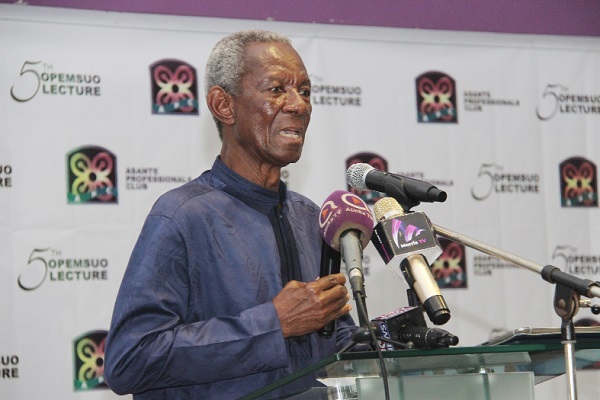An economist, statesman and member of the New Patriotic Party, Kwame Pianim, says it is vexing for the Finance Minister, Ken Ofori-Atta, to lead Ghana’s domestic debt exchange programme (DDEP) because he led the country into bankruptcy.
According to Mr Pianim, he will not contribute a pesewa to the DDEP because it was being led by a Finance Minister who led Ghana into the gutter.
He said the Ghanaian people deserved an apology from Mr Ofori-Atta for the hardship the citizens would go through for the next three decades.
“…I would have been proud as a Ghanaian to contribute but I will not contribute one pesewa for Ken Ofori-Atta leading this, he led us into the gutter…,” Mr Pianin said in a televised interview with TV3.
“He should have said I apologise, this is the result of economic mismanagement. I apologise to Ghanaian people, look some pensioners have put their resources into government bonds, and you’re asking them, I’m not going to pay, look at the exchange programme and think about it carefully when you are talking to your colleagues. Ken is saying, I’m not going to pay any interest on this for these years whiles I’m Minister of Finance and while President is still President but afterwards then you’re going to take a look at it.
“The IMF, three billion that they’re going to give is, I want them to frontload it so that I chop it before I go, is that genuine? Are you serious that this is genuine? If the President wants Ken Ofori-Atta to continue there, this government will go do down with Ken Ofori-Atta”
In his view, the economy was sitting on a time bomb waiting to explode.
He also added that it was wrong for President Nana Addo Dankwa Akufo-Addo to appoint Mr Ofori-Atta as caretaker Minister at the Ministry of Trade and Industry following the resignation of Alan Kyerematen giving his performance at the Finance Ministry.
“The first time Ofori-Atta started, he said he was going to transform this economy from the Guggisberg economy to a new economy. He did not even understand what the Guggisberg economy was,” he said.
“In the Guggisberg economy, he had a plan for cocoa, distribute cocoa, built roads into the villages, where there was timber he built the roads, then he built railways, he built the ports, he built Achimota school, built Legon infrastructure, by the time we got independence we had plenty of reserves.
“So Ken, if the monies he borrowed, if he was running a Guggisberg economy, we could have seen that cash flow coming out from the monies he was borrowing so that we can be able to repay. All the time he was borrowing recklessly. At the back of his mind was that he was not going to pay.”
On December 5, 2022, the government, in its quest to address what has now become an economic crisis, launched a domestic debt exchange under which it invited certain holders of approximately GH¢137.3 billion of the principal amount outstanding of certain of its domestic notes and bonds issued by the government, E.S.L.A. Plc or Daakye Trust Plc to exchange their Eligible Bonds for a package of new bonds to be issued by the government.
The expiration date was December 19, 2022.
However, the government subsequently announced an extension of the expiration date to Friday, December 30, 2022, and the settlement date to Friday, January 6, 2023.
Among many other issues including the various agitations from labour and the financial services sector, the government, on December 24, announced its decision to extend the expiration date of the invitation from Friday, December 30, 2022, to Monday, January 16, 2023, at 4:00 p.m.
Per a press release circulated by the Ministry of Finance, the settlement date for the invitation is now expected to occur on Tuesday, January 24, 2023, or as soon as practicable thereafter, but no later than the longstop date which is now scheduled for Tuesday, January 31, 2023, unless further extended by the government under the invitation.
The announcement date per the release is now expected to occur on or about January 17, 2023.
New terms
In addition to the foregoing extensions, the government announced the following modifications to the Invitation to Exchange, which are outlined in further detail on a Term Sheet:
Offering accrued and unpaid interest on eligible bonds, and a cash tender fee payment to holders of eligible bonds maturing in 2023;
Increasing the new bonds offered by adding eight new instruments to the composition of the new bonds, for a total of 12 new bonds, one maturing each year starting January 2027 and ending January 2038;
Modifying the Exchange Consideration Ratios for each new bond. The Exchange Consideration Ratio applicable to eligible bonds maturing in 2023 will be different than for other eligible bonds;
Setting a non-binding target minimum level of overall participation of 80 per cent of the aggregate principal amount outstanding of eligible bonds; and
Expanding the type of investors that can participate in the exchange to now include individual investors.
These modifications, the release said, will be set forth fully in an amended and restated exchange memorandum which is expected to be published during the week of December 26, 2022. Conforming changes (including adding and modifying defined terms) in respect of the above amendments and modifications to cure ambiguity, omission, defect, error or inconsistency may be included in the amended and restated exchange memorandum.


